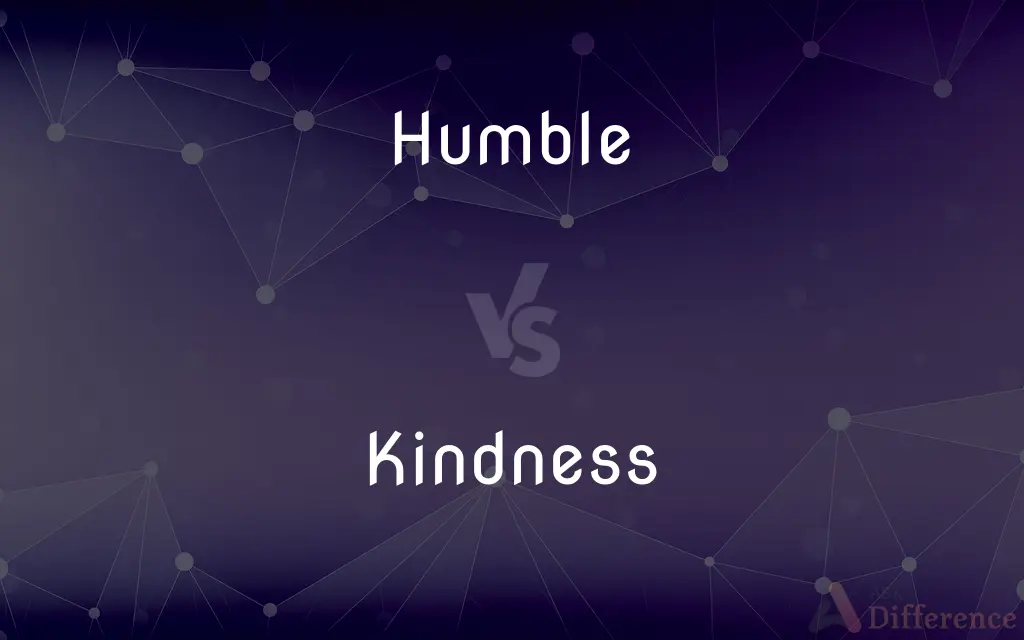Humble vs. Kindness — What's the Difference?
By Tayyaba Rehman — Published on October 16, 2023
Humble refers to having or showing a modest or low estimate of one's importance; kindness refers to the quality of being friendly, generous, and considerate.

Difference Between Humble and Kindness
Table of Contents
ADVERTISEMENT
Key Differences
Humble and kindness are terms that pertain to virtues but represent different aspects of human behavior. Being humble denotes a modest view of one’s own importance, where an individual doesn’t consider themselves superior to others. On the contrary, kindness refers to the quality of being friendly, generous, and considerate, emphasizing an individual’s behavior and actions towards others, which can encompass a variety of benevolent acts.
To be humble is to exhibit a lack of arrogance or pretense, reflecting an understanding and acceptance of one’s limitations and flaws. It is an inward quality, related to one’s self-perception and attitude. In contrast, kindness is an outward expression of goodwill and compassion, directed towards other people, animals, or entities, which can manifest through acts of help, understanding, and generosity.
The quality of being humble often involves a level of self-restraint and the avoidance of excessive self-pride or ego, allowing individuals to maintain a balanced and realistic view of themselves. Whereas kindness is proactive, involving actions or behaviors that aim to bring comfort, happiness, or assistance to others, showing a concern for the well-being of those around oneself.
A humble disposition allows an individual to approach life and relationships with an open and learning mindset, appreciating others’ value and acknowledging one’s own shortcomings and need for growth. Conversely, kindness fosters positive and constructive interactions, contributing to social harmony and cooperation by promoting mutual respect and empathy.
In essence, while humble pertains more to one’s attitude and perspective about oneself, relating to modesty and lack of arrogance, kindness pertains to one’s behavior towards others, signifying benevolence and a desire to contribute to the well-being and happiness of others.
ADVERTISEMENT
Comparison Chart
Definition
A modest view of one’s own importance.
The quality of being friendly, generous, and considerate.
Focus
Self-perception and attitude.
Actions and behaviors towards others.
Expression
Inward, related to lack of arrogance or pretense.
Outward, manifested through benevolent acts.
Contribution
Enables personal growth and open-mindedness.
Fosters social harmony and mutual respect.
Nature
Reflective and receptive.
Proactive and giving.
Compare with Definitions
Humble
Reflecting an understanding and acceptance of one’s flaws.
His humble acceptance of his mistakes showed his maturity.
Kindness
The quality of being friendly, generous, and considerate.
Her kindness towards strangers was remarkable.
Humble
Having or showing a modest estimate of one's importance.
Despite his success, he remained humble and approachable.
Kindness
Expressing concern and support for the well-being of others.
The kindness shown by the volunteers brought joy to the residents.
Humble
Marked by modesty in behavior, attitude, or spirit.
She led a humble life, devoted to helping others.
Kindness
An act of goodwill and compassion towards others.
Random acts of kindness can create a positive ripple effect in communities.
Humble
Marked by meekness or modesty in behavior, attitude, or spirit; not arrogant or prideful.
Kindness
A benevolent and helpful action or disposition.
His act of kindness made a significant difference in her life.
Humble
Showing deferential or submissive respect
A humble apology.
Kindness
A tendency to choose to be kind and generous to others.
His kindness was reflected in his everyday actions and demeanor.
Humble
Low in rank, quality, or station; unpretentious or lowly
A humble cottage.
Kindness
Kindness is a type of behavior marked by acts of generosity, consideration, or concern for others, without expecting praise or reward. Kindness was one of the main topics in the Bible.
Humble
To cause to feel humble
"He was humbled by the lack of consolation in Kornblum's expression" (Michael Chabon).
Kindness
The quality of being friendly, generous, and considerate
He thanked them for their kindness and support
Humble
To cause to have a lower condition or status; abase.
Kindness
The quality or state of being kind.
Humble
Not pretentious or magnificent; unpretending; unassuming.
He lives in a humble one-bedroom cottage.
Kindness
An instance of kind behavior
Your kindnesses won't be forgotten.
Humble
Having a low opinion of oneself; not proud, arrogant, or assuming; modest.
Kindness
The state of being kind.
Jamie's kindness is legendary, so much that people have taken advantage of her.
Humble
(ambitransitive) To defeat or reduce the power, independence, or pride of
Kindness
An instance of kind or charitable behaviour.
Do me a kindness and leave.
I'm going to turn a blind eye to this misdemeanour, out of the kindness of my heart.
Humble
To make humble or lowly; to make less proud or arrogant; to make meek and submissive.
Kindness
The state or quality of being kind, in any of its various senses; manifestation of kind feeling or disposition beneficence.
I do fear thy nature;It is too full o' the milk of human kindnessTo catch the nearest way.
Unremembered actsOf kindness and of love.
Humble
To hum.
Humbling and bumbling
Kindness
A kind act; an act of good will; as, to do a great kindness.
Humble
(transitive) hummel.
Kindness
The quality of being warm-hearted and considerate and humane and sympathetic
Humble
An arrest based on weak evidence intended to demean or punish the subject.
Kindness
Tendency to be kind and forgiving
Humble
Near the ground; not high or lofty; not pretentious or magnificent; unpretending; unassuming; as, a humble cottage.
THy humble nest built on the ground.
Kindness
A kind act
Humble
Thinking lowly of one's self; claiming little for one's self; not proud, arrogant, or assuming; thinking one's self ill-deserving or unworthy, when judged by the demands of God; lowly; waek; modest.
God resisteth the proud, but giveth grace unto the humble.
She should be humble who would please.
Without a humble imitation of the divine Author of our . . . religion we can never hope to be a happy nation.
Humble
Hornless. See Hummel.
Humble
To bring low; to reduce the power, independence, or exaltation of; to lower; to abase; to humilate.
Here, take this purse, thou whom the heaven's plaguesHave humbled to all strokes.
The genius which humbled six marshals of France.
Humble
To make humble or lowly in mind; to abase the pride or arrogance of; to reduce the self-sufficiently of; to make meek and submissive; - often used rexlexively.
Humble yourselves therefore under the mighty hand of God, that he may exalt you.
Humble
Cause to be unpretentious;
This experience will humble him
Humble
Cause to feel shame; hurt the pride of;
He humiliated his colleague by criticising him in front of the boss
Humble
Low or inferior in station or quality;
A humble cottage
A lowly parish priest
A modest man of the people
Small beginnings
Humble
Marked by meekness or modesty; not arrogant or prideful;
A humble apology
Essentially humble...and self-effacing, he achieved the highest formal honors and distinctions
Humble
Used of unskilled work (especially domestic work)
Humble
Of low birth or station (`base' is archaic in this sense);
Baseborn wretches with dirty faces
Of humble (or lowly) birth
Humble
Lacking pretentiousness or vanity; unassuming.
Her humble demeanor endeared her to her peers.
Humble
Not having or showing any feelings of superiority, self-assertiveness, or showiness.
His humble approach to discussions facilitated constructive dialogue.
Common Curiosities
What is kindness?
Kindness is the quality of being friendly, generous, and considerate to others.
Can a person be both humble and kind?
Absolutely, a person can be both humble, showing modesty and lack of arrogance, and kind, exhibiting benevolence and goodwill towards others.
How does humble relate to self-perception?
Being humble relates to having a modest, realistic, and unpretentious view of oneself, recognizing one’s flaws and limitations.
What does humble mean?
Humble means having or showing a modest or low estimate of one's own importance.
Is being humble about having low self-esteem?
No, being humble is about having a balanced and realistic self-view, recognizing one’s value and shortcomings without devaluing oneself.
How is kindness expressed?
Kindness is expressed through benevolent actions, behaviors, and attitudes directed towards others, showing goodwill and compassion.
How does kindness contribute to social harmony?
Kindness fosters mutual respect, understanding, and empathy among individuals, creating positive interactions and reducing conflicts, thus contributing to social harmony.
Can acts of kindness have a positive impact on the giver?
Yes, performing acts of kindness can boost the well-being, happiness, and fulfillment of the giver, creating a sense of purpose and connection.
Does kindness only involve big, generous acts?
No, kindness can be expressed through both big and small acts of consideration, generosity, and compassion towards others.
Is being humble a sign of weakness?
No, being humble is a sign of strength and maturity, reflecting an understanding and acceptance of one’s limitations and a willingness to learn and grow.
Can being humble lead to personal growth?
Yes, being humble can lead to personal growth by fostering an open and learning mindset and allowing individuals to appreciate others and recognize areas for self-improvement.
Why is kindness important in society?
Kindness is crucial in society as it fosters a sense of community, cooperation, and support, creating a positive and inclusive environment for all individuals.
Is humility the same as being humble?
Yes, humility is the quality or state of being humble, reflecting a modest view of one’s importance and a lack of arrogance or pretentiousness.
How does being humble affect relationships?
Being humble can positively impact relationships by promoting mutual respect, open communication, and understanding, reducing the likelihood of conflicts.
Share Your Discovery

Previous Comparison
Complete Combustion vs. Incomplete Combustion
Next Comparison
In Vitro vs. In VivoAuthor Spotlight
Written by
Tayyaba RehmanTayyaba Rehman is a distinguished writer, currently serving as a primary contributor to askdifference.com. As a researcher in semantics and etymology, Tayyaba's passion for the complexity of languages and their distinctions has found a perfect home on the platform. Tayyaba delves into the intricacies of language, distinguishing between commonly confused words and phrases, thereby providing clarity for readers worldwide.














































